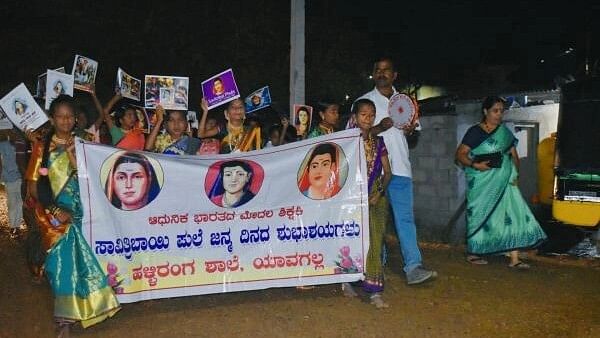
Veerappa and his students undertake a procession to mark the birth anniversary of Savitribai Phule.
Credit: DH Photo
Every evening, the narrow Savitribai Phule lane in Yavagal village of Ron taluk in Gadag district comes to life with the laughter and songs of nearly 30 children. They are attending a special ‘school’ run by Veerappa Taladavar, a 36-year-old electrical signal maintainer with the South Western Railways.
For the next two hours, the students learn not just their school syllabus, but also lessons on their rights and responsibilities, at the ‘Halli Rangashaale’. Veerappa uses plays and songs to teach the students, the majority of whom come from marginalised communities.
Yavagal borders Nargund in Dharwad district. The village is counted among the most backward regions, both, in terms of the economic and human development indices. A large number of the residents, especially female students, have dropped out of school due to a lack of learning opportunities.
Veerappa was among the very few from the village who literally walked the extra mile to access education. He eventually landed a government job. And in 2019, when he was transferred to Hombal railway station in Gadag district, his joy had no bounds.
“Education changed my life completely, and I realised the only way I could change the futures of children in my village was by providing them with a good education too,” says Veerappa. Shuttling nearly 50 km every day between his workplace and village, Veerappa envisioned a school that could prepare the students of his hometown for higher education.
So, the Halli Rangashaale came to life. It became a place where students could learn both, class-related material, but also gain exposure to the syllabus of life. They would exercise, and learn spoken English, drama, music and literature.
Daily sessions
A typical day for the students at this school starts with their teacher, Veerappa, going around to homes, waking students up at around 6:30 am for morning yoga and drills such as march-past.
Later, the 30 students, depending upon their class schedules, attend one of the three government schools, including a girls' high school, near the village. At around 6 pm in the evening, the students start trickling into the Rangashaale premises. They first offer prayers to ‘Kannadambe’, following which they recite vachanas and catch up on daily news from various newspapers.
Students draw during a session at the Rangashaale.
Next, they are grouped based on their classes. The students, in turn, read out their notes aloud, so that their peers can provide feedback and exchange ideas. However, it is the last part of the class that draws the most interest. This is the segment where they rehearse plays and songs.
These sessions have helped at least five students win district and state-level awards at cultural events.
Pavithra Hebsur, a class eight student, says that attending Veerappa's classes has helped her feel more prepared to learn at school. “For students in villages like us, English and mathematics are tough to learn. However, revising at Veerappa Sir’s classes is keeping me in good stead,” she says, in fluent English. Pavithra wants to prepare for BEd and become a teacher, so she can help other students.
Growing effort
Another good practice at the school includes mentorship, where older students in classes seven and eight teach students in primary grades. Laxmi Konnur, a class seven student, says this has helped her communication skills and improved her understanding of the subjects.
This effort, which first started in Veerappa's front yard, has grown to such a level that he was forced to take out a loan and build a classroom next to his house. “A majority of the villages have seen slow progress because those who have progressed are not connected to their roots. If each one of us makes even a minor contribution to our village, our nation can easily progress,” he says.
To sustain the initiative, Veerappa has allocated half of his railway salary to the school. Supplementing this, are donors and village elders who have helped at times of need. Gadigeppa Kadiyavar (85), a village elder who has seen Veerappa's effort and helped him in the past, says the majority of the students who attend this free school come from very poor financial backgrounds. “Had Veerappa not started these classes, the majority of the students would have ended up school dropouts,” he says.
Inspired by his efforts, more than 18 such schools started across the state during the Covid lockdown. However, over the years, they phased out and only one school in Vijayapura is functioning now.
Amidst the success of his own efforts, Veerappa has one enduring concern. “My senior officials at the South Western Railway have been very supportive and have encouraged me to follow my passion for teaching. But if I am transferred out to a far-off place, I may not be able to continue this school,” he says.